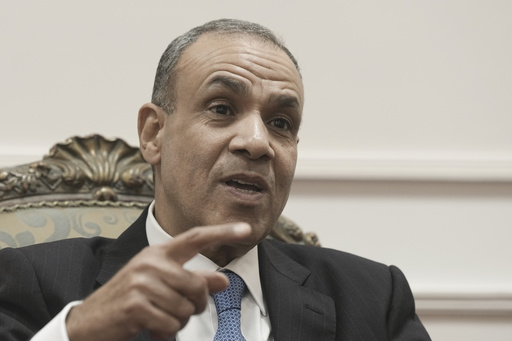
NEW ADMINISTRATIVE CAPITAL, Egypt – On Thursday, Egypt’s Foreign Minister called for Israel and Hamas to expedite the implementation of a ceasefire plan for Gaza, thus increasing the pressure on Israeli Prime Minister Benjamin Netanyahu to endorse the agreement.
During a critical moment in the ongoing push to cease a complicated 15-month conflict, Badr Abdelatty made this statement shortly after President Joe Biden and other international mediators revealed a ceasefire agreement. However, Netanyahu maintained that no deal had yet been established.
In a unique interview, Abdelatty refrained from addressing Netanyahu’s assertions that Hamas had failed to meet specific commitments outlined in the agreement. He did highlight that the deal was made possible through extensive involvement from mediators from the U.S., Qatar, and Egypt, including officials from the incoming administration of President-elect Donald Trump.
“We have a deal. What’s essential now is to begin the execution,” Abdelatty asserted from the Foreign Ministry’s offices located in The New Administrative Capital, a newly developed area situated approximately 45 kilometers (28 miles) east of Cairo.
He emphasized Egypt’s ongoing efforts to secure final approval and prompt implementation of the agreement. As a country that maintains a peace treaty with Israel and shares a border with Gaza, governed by Hamas, Egypt has long been a crucial mediator between the two groups and plays a significant role in current ceasefire discussions.
Plans are underway for continued meetings in Cairo involving the U.S., Qatar, and Egypt aimed at facilitating the agreement. Abdelatty indicated that these discussions would commence soon, with an “operation room” established in the Egyptian capital to monitor the deal’s progress.
“We are fully committed to fulfilling our own obligations and expect others to uphold theirs as well,” he added.
Despite suffering significant losses during the conflict, Hamas seems to have retained its structure, maintaining combat operations against Israeli forces while continuing to provide essential services to the populace. While Abdelatty did not elaborate on Hamas’ strength, he made it clear that they would not be involved in the governance of Gaza following the conflict.
He stated that the internationally acknowledged Palestinian Authority, which has been governed from the West Bank since being ousted by Hamas in 2007, is the rightful entity to guide Gaza after the war. “We need to empower the Palestinian Authority,” he mentioned, adding that Egypt is prepared to collaborate with the U.S. “to strengthen the Palestinian police and enhance security in Gaza.”
Abdelatty reiterated that the ultimate resolution to the Israeli-Palestinian conflict lies in the creation of an independent Palestinian state blending the West Bank and Gaza. The departing Biden administration has advocated for empowering the Palestinian Authority to regain influence in post-war Gaza—an idea that Netanyahu and his far-right affiliates dispute.
As part of the emerging agreement, considerable humanitarian support is anticipated to be delivered to Gaza through Egypt’s Rafah border crossing. This gateway, which serves as Gaza’s primary exit to the outside world, has remained closed since the Israeli forces took control of the area last May.
Abdelatty stated that Egypt is keen to reopen the crossing as promptly as possible to facilitate the entry of approximately 600 trucks daily “because people are in desperate need.” He noted that logistical arrangements are still in progress but indicated that Egypt would be amenable to the return of civilian observers from the European Union.
An EU operation previously managed the crossing in collaboration with Israel and the Palestinian Authority for two years until Hamas took control. Meanwhile, in Brussels, a spokesman for the European Commission confirmed that the EU is considering reengaging at the crossing, with an EU mission anticipated to arrive in Cairo next week.
“The EU’s presence would be significantly valuable,” Abdelatty concluded.
Egypt has also faced challenges due to the ongoing conflict, including disruptions to shipping routes through the Suez Canal caused by attacks from Houthi rebels in Yemen, leading to an estimated monthly revenue loss of $600 million. Additionally, he highlighted that the presence of approximately 10 million refugees and migrants—among them many Palestinians from Gaza—has further strained the country’s resources. “We are not a wealthy nation,” he asserted.

